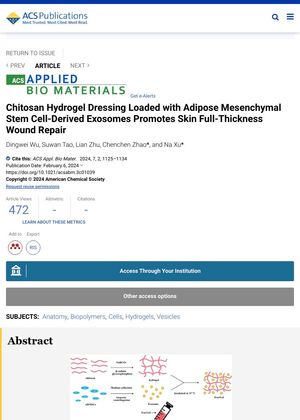TLDR The new Exo/Gel dressing with stem cell-derived particles helps skin wounds heal faster.
The study investigates a composite wound dressing (Exo/Gel) made from chitosan hydrogel and adipose mesenchymal stem cell-derived exosomes (ADMSC–Exo) to enhance full-thickness skin wound repair. The Exo/Gel dressing facilitates slow release of exosomes as the hydrogel degrades, promoting cell migration and angiogenesis in vitro. In a rat skin wound model, the dressing improved collagen deposition, angiogenesis, and hair follicle regeneration, demonstrating its potential to accelerate skin wound healing and offering a promising strategy for developing advanced wound dressings.
 July 2023 in “Stem Cells Translational Medicine”
July 2023 in “Stem Cells Translational Medicine” Mesenchymal Stem/Stromal Cells (MSCs) help in wound healing and tissue regeneration, but can also contribute to tumor growth. They show promise in treating chronic wounds and certain burns, but their full healing mechanisms and potential challenges need further exploration.
 76 citations
,
February 2021 in “International Journal of Molecular Sciences”
76 citations
,
February 2021 in “International Journal of Molecular Sciences” Mesenchymal stem cells show potential for skin healing and anti-aging, but more research is needed for safe use, especially regarding stem cells from induced pluripotent sources.
 48 citations
,
July 2019 in “International Journal of Biological Macromolecules”
48 citations
,
July 2019 in “International Journal of Biological Macromolecules” A new hydrogel with stem cells from human umbilical cords improves skin wound healing and reduces inflammation.
January 2025 in “Cosmetics” Exosomes could improve skin care, but more research is needed to confirm their safety and effectiveness.
March 2024 in “Biomedicines” Mesenchymal stem cells show promise for effective skin repair and regeneration.
116 citations
,
August 2021 in “Stem Cell Research & Therapy” Menstrual blood stem cell vesicles show promise for treating various medical conditions.
 1 citations
,
January 2024 in “Theranostics”
1 citations
,
January 2024 in “Theranostics” Exosomes show promise for future tissue regeneration.
 72 citations
,
January 2023 in “International Journal of Biological Sciences”
72 citations
,
January 2023 in “International Journal of Biological Sciences” Engineered exosomes show promise for improving wound healing but face challenges in clinical use.





